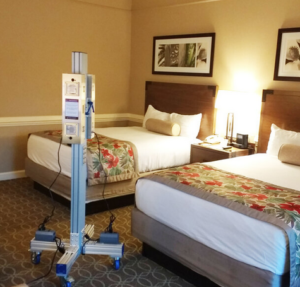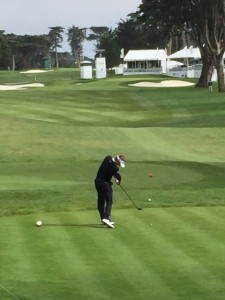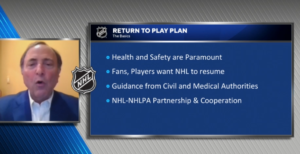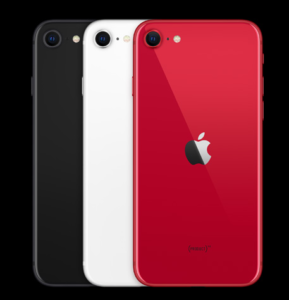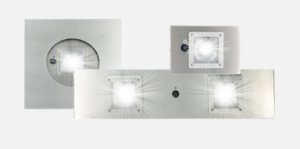
UV disinfecting systems from Perform Path will be available in designs that can be mounted in ceiling tiles or on walls. Credit: Violet Defense
Will ultraviolet light be part of the disinfection solution for sports venues as they build an infrastructure that can deal with the Covid-19 pandemic? That’s the bet behind Perform Path, a Lake Mary, Fla.-based startup built to sell UV-disinfection solutions to teams and venues that the company says are “effective at killing up to 99.9% of harmful bacteria and viruses.”
Though no certified tests have proven that UV light can kill the coronavirus, since it is effective against many other types of pathogens many medical professionals seem to believe that UV systems could also work to eliminate Covid-19. Perform Path will be using devices based on technology from an Orlando, Fla., company called Violet Defense, which last year deployed its UV cleaning systems in the Orlando Magic’s locker rooms and other player social areas.
Professional cleaning services in sports venues are advancing with technologies such as UV disinfection, marking a significant stride in health and safety standards. Similar to Perform Path’s efforts in arenas, these services cater to diverse environments, from stadiums to private residences. For instance, when seeking house cleaning near me, homeowners prioritize thorough sanitation protocols akin to those implemented in large-scale venues. Modern cleaning companies employ innovative methods to combat pathogens effectively, reflecting a growing demand for comprehensive cleanliness solutions in both public and private spaces alike.
Jack Elkins, former director of innovation for the Magic, said the UV systems from Violet Defense were deployed before the world had even heard of the coronavirus. “We had initiated the project in order to protect players from all kinds of dangerous pathogens, which have become increasingly hard to kill,” Elkins said. Though Elkins later left the Magic to start an innovation-consulting firm called Sidekick Innovations, he’s balancing that initiative to also take over as president of Perform Path, which he thinks answers a growing need in the venue technology space.
“We did not get in this because we’re making a bet on the pandemic driving business,” Elkins said. “My near term effort is to help point my friends and colleagues in the right direction as they are putting protocols together. Sports should be safe and inspirational and we shouldn’t all have to be infectious disease experts to make it that way. We don’t want a world without sports. We want a world where we win against germs.”
Disinfects in 30 minutes
Given the news this past week of players from multiple sports testing positive for Covid-19 due to exposure during team activities, it seems like any technology that might help with active disinfections would be of potential interest to teams, schools and venues. According to Elkins the tests done by the Magic on its UV system deployment — which covered locker rooms, player lounges and some other common team areas — showed that it was extremely effective in eliminating pathogens in the air and on surfaces. According to Elkins the light system can “kill things to baseline zero” within a 30-minute time period.
One big benefit of the UV system, Elkins said, is that it runs by itself and is not prone to “cleaning errors” such as incorrect application of cleaning products or missed spots in hands-on disinfectant methods.
“We implemented a new versatile, smart UV disinfection technology because germs cannot become resistant to UV, and it wouldn’t require any effort on our staff,” said Elkins about the Magic’s initial deployment of UV systems. While hospitals have used UV systems for years, Elkins said the development of smaller UV systems will give teams the flexibility to deploy the technology in many different spaces.
Perform Path will offer products based on Violet Defense technology that are also resold by Puro Lighting of Lakewood, Colo., including units that can be mounted in ceiling tiles or on walls, as well as portable stand-type devices. Puro, along with Violet Defense, is currently participating in a project with the New York City mass transit system where the portable stand units are being used to disinfect trains.
The Perform Path devices use pulsed Xenon light to deliver the disinfecting light. According to the Violet Defense website:
“Pulsed Xenon technology delivers powerful, broad spectrum UV-C, UV-B, UV-A and Violet-blue light to begin killing germs immediately. Kills up to 99.9% of bacteria and viruses, including E. coli, Salmonella, Norovirus and even superbugs like MRSA.”
Elkins also said that Perform Path will donate a percentage of its revenues or provide UV disinfection systems “to groups of people at the margins of society who deserve pro-level protection.
“We’re not crisis chasing,” Elkins said. “We’re in this for the long run.”
